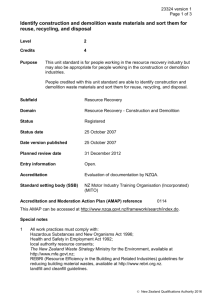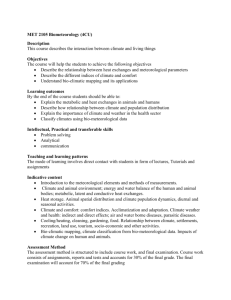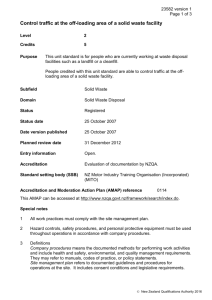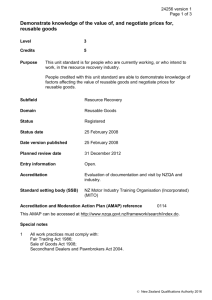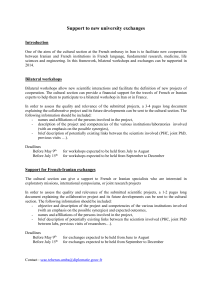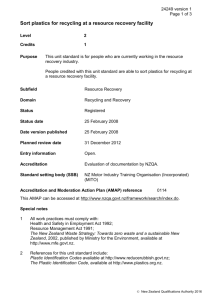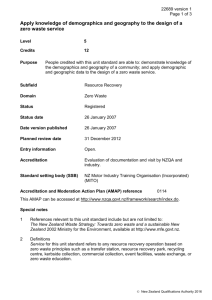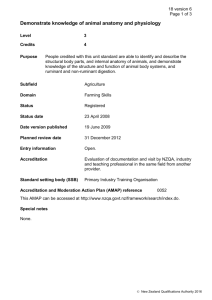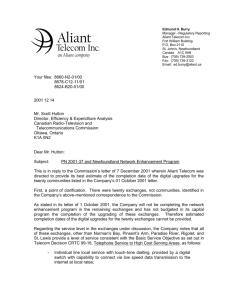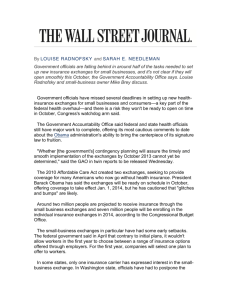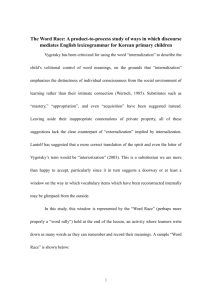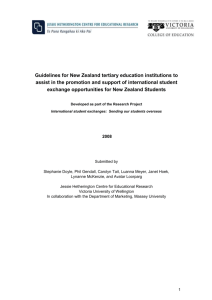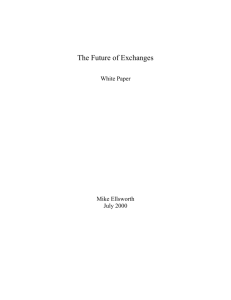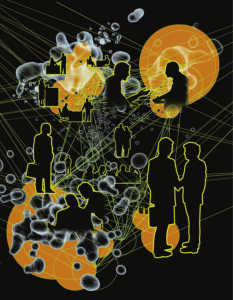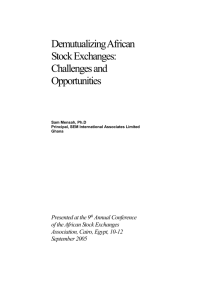24258 Demonstrate basic knowledge of, and source reusable goods
advertisement
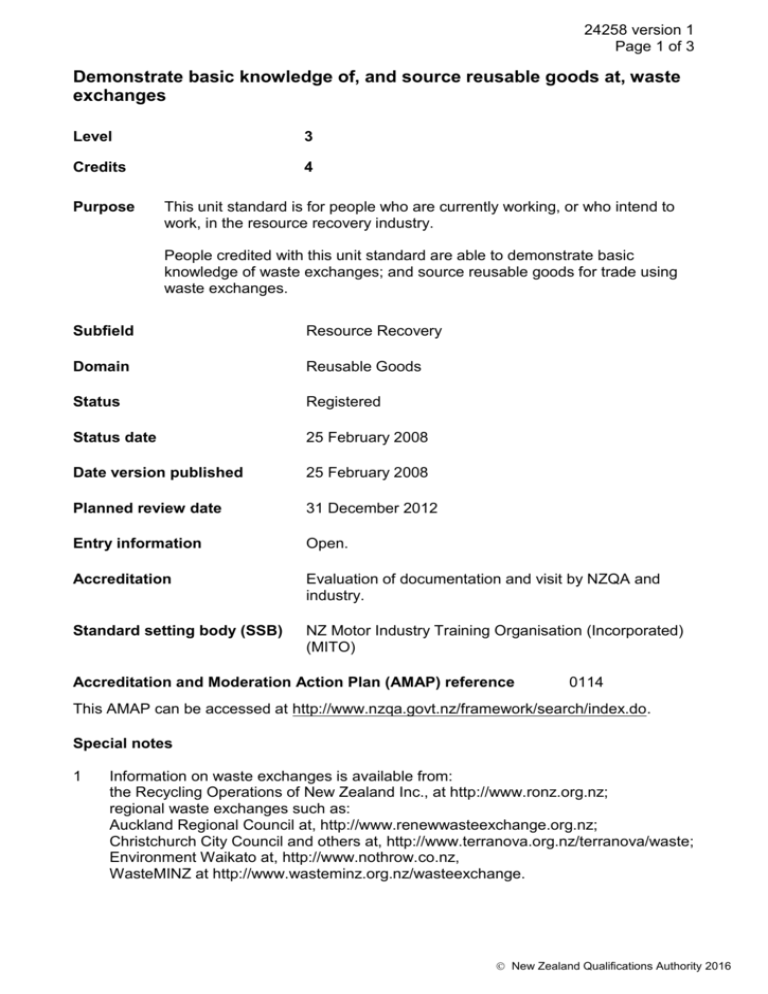
24258 version 1 Page 1 of 3 Demonstrate basic knowledge of, and source reusable goods at, waste exchanges Level 3 Credits 4 Purpose This unit standard is for people who are currently working, or who intend to work, in the resource recovery industry. People credited with this unit standard are able to demonstrate basic knowledge of waste exchanges; and source reusable goods for trade using waste exchanges. Subfield Resource Recovery Domain Reusable Goods Status Registered Status date 25 February 2008 Date version published 25 February 2008 Planned review date 31 December 2012 Entry information Open. Accreditation Evaluation of documentation and visit by NZQA and industry. Standard setting body (SSB) NZ Motor Industry Training Organisation (Incorporated) (MITO) Accreditation and Moderation Action Plan (AMAP) reference 0114 This AMAP can be accessed at http://www.nzqa.govt.nz/framework/search/index.do. Special notes 1 Information on waste exchanges is available from: the Recycling Operations of New Zealand Inc., at http://www.ronz.org.nz; regional waste exchanges such as: Auckland Regional Council at, http://www.renewwasteexchange.org.nz; Christchurch City Council and others at, http://www.terranova.org.nz/terranova/waste; Environment Waikato at, http://www.nothrow.co.nz, WasteMINZ at http://www.wasteminz.org.nz/wasteexchange. New Zealand Qualifications Authority 2016 24258 version 1 Page 2 of 3 2 Definitions Company procedures means the documented methods for performing work activities and includes health and safety, environmental, and quality management requirements. They may refer to manuals, codes of practice, or policy statements. Reusable goods refer to discarded resources that are able to be recovered without reprocessing or remanufacture. Typically these include clothing, textiles, household items, tools, sports equipment, bric-a-brac, furniture, and exclude motor vehicles and pawned goods. Elements and performance criteria Element 1 Demonstrate basic knowledge of waste exchanges. Performance criteria 1.1 Terms used for waste exchanges are described in accordance with regional waste exchange references. Range 1.2 The purposes of waste exchanges are explained in accordance with regional waste exchange references and/or the Recycling Operators of New Zealand. Range 1.3 responsibilities include but are not limited to those of – territorial authority, trust board. Access to, and functions of, waste exchanges are described in accordance with regional waste exchange references and local waste exchange data Range 1.5 purposes include but are not limited to – waste minimisation. Responsibilities for, and structure of, waste exchanges are described in accordance with regional waste exchange references and local waste exchange data. Range 1.4 terms may include but are not limited to – waste materials exchange, resource exchange, recovered materials. access – open, restricted; function includes but is not limited to – directory, newsletter, website, communication between buyer and seller, payment; evidence is required for at least two waste exchanges. Different resources available at waste exchanges are identified in relation to specific waste exchanges. Range resources – general, special; evidence is required for at least four waste exchanges. New Zealand Qualifications Authority 2016 24258 version 1 Page 3 of 3 Element 2 Source reusable goods for trade using waste exchanges. Range trade as a buyer or seller; three waste exchanges – at least one local. Performance criteria 2.1 Goods to be sourced are identified and their requirements are confirmed in accordance with company procedures. Range requirements – type, quantity, quality; requirements may include but are not limited to – frequency, price range. 2.2 Goods are sourced and details for processing the exchange are confirmed in accordance with the requirements of the waste exchange. 2.3 Communication with the buyer and/or seller is recorded in accordance with company procedures. Please note Providers must be accredited by NZQA, or an inter-institutional body with delegated authority for quality assurance, before they can report credits from assessment against unit standards or deliver courses of study leading to that assessment. Industry Training Organisations must be accredited by NZQA before they can register credits from assessment against unit standards. Accredited providers and Industry Training Organisations assessing against unit standards must engage with the moderation system that applies to those standards. Accreditation requirements and an outline of the moderation system that applies to this standard are outlined in the Accreditation and Moderation Action Plan (AMAP). The AMAP also includes useful information about special requirements for organisations wishing to develop education and training programmes, such as minimum qualifications for tutors and assessors, and special resource requirements. Comments on this unit standard Please contact the NZ Motor Industry Training Organisation (Incorporated) (MITO) info@mito.org.nz if you wish to suggest changes to the content of this unit standard. New Zealand Qualifications Authority 2016
